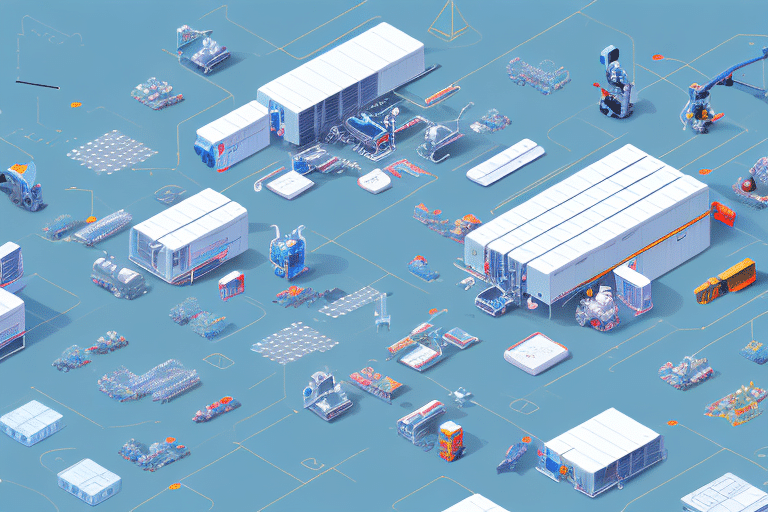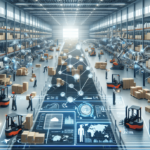Exploring the Latest Logistics Innovations
In recent years, the logistics industry has experienced a surge of innovation. Technologies such as drones, AI-powered systems, and blockchain have revolutionized logistics and supply chain management. This article delves into the latest logistics innovations and their transformative impact on the industry.
1. Technological Advancements Transforming Logistics
Technological innovations are fundamentally changing logistics and supply chain management. Key technologies driving this transformation include automation, robotics, drones, artificial intelligence (AI), and big data analytics.
Automation and Robotics
Automation enhances efficiency by handling routine tasks like order processing and inventory management. According to a Statista report, the global automation market in logistics is projected to reach $50 billion by 2025. Robotics plays a pivotal role in warehouses, with robots efficiently picking, packing, and transporting goods.
Drones in Logistics
Drones are increasingly used for inventory inspections and last-mile deliveries. A BBC study highlights that drone deliveries can reduce delivery times by up to 70%, especially in remote areas.
Artificial Intelligence and Big Data
AI-powered systems analyze vast datasets to optimize operations and decision-making. Big data analytics provides actionable insights, enabling predictive maintenance and demand forecasting. According to McKinsey, companies leveraging big data can achieve a 5-6% increase in productivity.
2. The Impact of Automation on Modern Logistics
Automation is revolutionizing logistics by streamlining operations and reducing human error. Automated systems manage tasks such as inventory tracking, order fulfillment, and transportation scheduling.
Efficiency and Cost Reduction
Automation significantly cuts labor costs and enhances operational efficiency. For instance, automated warehouses can operate 24/7 without the need for breaks, increasing throughput and reducing delays.
Enhanced Accuracy and Safety
Automated systems minimize errors in order processing and inventory management, ensuring higher accuracy levels. Additionally, automation improves workplace safety by reducing the need for manual handling of heavy or hazardous materials.
3. Big Data Analytics in Logistics Management
Big data analytics is a game-changer for logistics, offering deep insights into every aspect of the supply chain. By processing large volumes of data, companies can optimize routes, manage inventory more effectively, and predict market trends.
Predictive Analytics
Predictive analytics leverages historical data to forecast future demand and potential disruptions. This foresight allows logistics companies to adjust operations proactively, minimizing costs and enhancing customer satisfaction.
Supply Chain Visibility
Big data enhances visibility across the supply chain, identifying bottlenecks and inefficiencies. Improved transparency leads to faster decision-making and more resilient supply chains.
4. The Rise of Drones in the Logistics Industry
Drones represent a significant innovation in logistics, particularly for last-mile delivery. Their ability to navigate difficult terrains and deliver packages swiftly makes them invaluable for e-commerce and remote deliveries.
Advantages of Drone Delivery
- Speed: Drones can bypass traditional traffic, reducing delivery times.
- Cost-Effective: Lower transportation costs compared to traditional delivery methods.
- Accessibility: Ideal for delivering to remote or hard-to-reach areas.
Regulatory Challenges
Despite their potential, drones face regulatory hurdles related to airspace management and safety standards. Collaboration with regulatory bodies is essential to integrate drones seamlessly into the logistics ecosystem.
5. AI-Powered Logistics Systems: Advantages and Challenges
AI is transforming logistics by optimizing routes, predicting maintenance needs, and enhancing customer service. AI-powered systems offer numerous benefits but also present challenges that need to be addressed.
Benefits of AI in Logistics
- Operational Efficiency: AI optimizes delivery routes, reducing fuel consumption and transit times.
- Predictive Maintenance: AI forecasts equipment failures, minimizing downtime.
- Enhanced Customer Experience: AI-driven chatbots and tracking systems improve customer interactions.
Challenges of AI Implementation
Implementing AI requires significant investment in technology and skilled personnel. Data privacy concerns and the need for continuous system updates also pose challenges.
6. Blockchain in Supply Chain Management
Blockchain technology offers a decentralized ledger for transparent and secure transactions in the supply chain. Its immutable nature ensures data integrity and enhances trust among stakeholders.
Benefits of Blockchain
- Traceability: Every transaction is recorded, providing end-to-end visibility.
- Fraud Reduction: Immutable records prevent unauthorized alterations.
- Efficiency: Streamlines processes by eliminating intermediaries.
Adoption Challenges
Scalability and interoperability are major challenges for blockchain adoption. Widespread collaboration among supply chain partners is necessary to realize its full potential.
7. Sustainable Practices in Logistics: Green Logistics
With increasing environmental concerns, green logistics focuses on sustainable practices to reduce the carbon footprint of logistics operations.
Eco-Friendly Transportation
The adoption of electric vehicles (EVs) and alternative fuels like biodiesel reduces emissions. Companies like DHL are investing in EV fleets to promote sustainability.
Optimized Routing and Packaging
Efficient routing minimizes fuel consumption, while sustainable packaging materials reduce waste. According to the Environmental Science Association, optimized logistics can cut emissions by up to 30%.
8. Collaborative Logistics: Enhancing Efficiency Through Partnerships
Collaborative logistics involves forming alliances and partnerships among logistics providers to share resources and optimize operations.
Shared Resources
By sharing warehouses, transportation vehicles, and other resources, companies can reduce costs and improve service levels.
Improved Flexibility
Collaboration allows companies to respond more swiftly to market changes and customer demands, enhancing overall supply chain resilience.
9. Future Trends in the Logistics Industry
The logistics industry is poised for further transformation driven by emerging technologies and evolving consumer expectations.
Increased Automation
The trend towards automation will continue, with advancements in robotics and AI driving further efficiencies.
Rise of On-Demand Delivery
On-demand delivery models, supported by technologies like AI and IoT, will gain popularity, catering to the instant gratification preferences of modern consumers.
Focus on Sustainability
Sustainability will remain a key focus, with companies investing in green technologies and practices to meet regulatory requirements and consumer expectations.
10. Overcoming Challenges in Modern Logistics
Logistics companies face numerous challenges, including managing complex supply chains, maintaining customer satisfaction, and adapting to technological changes.
Managing Complexity
Advanced supply chain management tools and big data analytics can help navigate the complexities of global logistics operations.
Enhancing Customer Satisfaction
Investing in customer service technologies and ensuring timely deliveries are crucial for maintaining high levels of customer satisfaction.
Adapting to Technological Changes
Continuous investment in technology and employee training ensures that logistics companies remain competitive in a rapidly evolving landscape.
11. Security and Risk Management in Logistics
Ensuring security and managing risks are paramount for logistics companies to protect their operations and customer data.
Cybersecurity Measures
Implementing robust cybersecurity protocols, including data encryption and regular security audits, safeguards against cyber threats.
Physical Security
Enhancing physical security measures, such as surveillance systems and secure storage facilities, minimizes the risk of cargo theft and damage.
Risk Mitigation Strategies
Developing comprehensive risk management plans helps identify potential threats and implement proactive measures to mitigate them.
In conclusion, the logistics industry is undergoing significant transformation driven by technological advancements and changing consumer demands. Embracing innovations like automation, AI, drones, and blockchain, while focusing on sustainability and security, will position logistics companies for success in the future. By addressing challenges and leveraging collaborative efforts, the industry can achieve greater efficiency, resilience, and customer satisfaction.






















